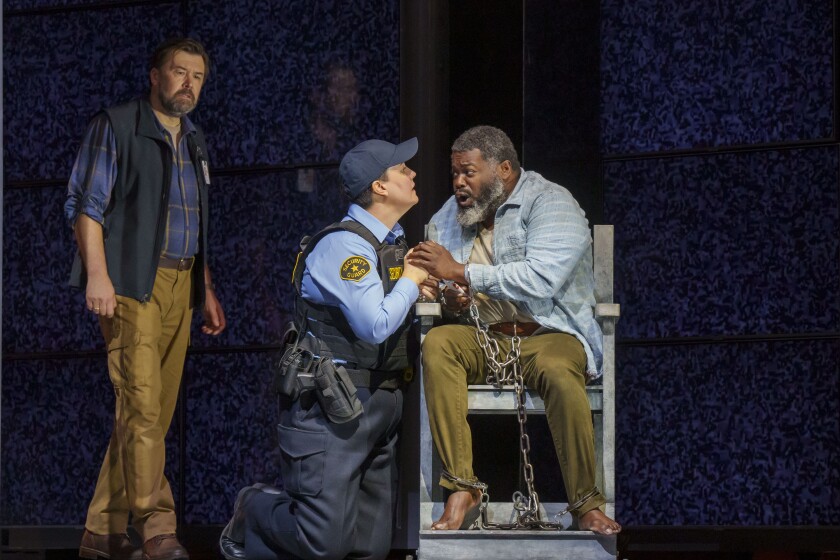
‘Aida’ at Lyric Opera of Chicago (Photo by Todd Rosenberg)
Highly Recommended
“Aida” by Giuseppe Verdi has returned to the Lyric Opera of Chicago after more than a decade. Under the direction of Francesca Zamnello and conducted by Enrique Mazzola, it is opera in the grand tradition but interpreted through a nontraditional lens.
Military leader Radames (tenor Russell Thomas) is in love with the captive Aida (soprano Michelle Bradley) who is enslaved in the household of princess Amneris (mezzo-soprano Jamie Barton) who happens to be in love with Radames. Therein lies the love triangle and principal conflict of this epic tragedy.
Rather than opening with a traditional crowd scene with an explanation of where we are and what is to come, this opera has a cold start with Radames ruminating on his love for Aida while sitting in what is apparently the war room of the unnamed kingdom. The highlight of this scene is Radames singing of “Celeste Aida” arguably the most lyrical aria in this opera and a favorite solo piece of tenors.
Amneris passes through the room and inquires as to why Radames is so distracted. When Aida enters, Radames’ demeanor changes and Amneris begins to suspect there may be something going on between the two.
The first two acts of the four-act opera are concerned largely with the armed conflict between the kingdom in which Radames serves and the kingdom of Amonasro (baritone Reginald Smith, Jr) who, unbeknownst to everyone, is the father of Aida.
The roughly sixty-voice men’s ensemble performs a thrilling chorus of preparation for battle, and shortly thereafter, a celebration of victory with Radames as the conquering hero.
Likewise, six dramatic trumpets play an impressive, well known, Verdi fanfare that at the end of Act Two, culminates in an impressive surprise celebration with 200 cast members on stage.
The preparation for battle and victory are further punctuated by ballet scenes choreographed by Jessica Lang that feature dancer Anne O’Donnell Passero who seemingly floats across the stage with dramatic lifts and leaps in a flowing white gown with golden lining that is truly angelic.
Originally conceived as a conflict between ancient Egypt and the kingdom of Ethiopia this updated version has a dystopian post-modern and mid-century vibe.
The costumes by Anita Yavich are a kind of mixed bag with some colorful gowns and drab dresses. Military uniforms are reminiscent of the fascist regimes of WWII with some more decorative officers looking like part of the Russian Imperial Army and the priests seeming to be part of the Greek Orthodox or ancient Jewish pharisees.
The mostly monochromatic set design led by set-designer Michael Yeargan is primarily a steely gray with tone-on-tone impressions of cryptic symbols reminiscent of hieroglyphs or Chinese pictographs.
Creating a dramatic and assaulting pop of color that commands your attention, the symbols also appear painted in blood red during powerful moments and at the tops of the ceremonial staff carried by the high priest Ramfis (bass Önay Köse).
The production’s striking original concept is conceived by artistic designer RETNA, a celebrated street artist based in Los Angeles.
As Radames is celebrated, a tormented Aida admonishes herself for praying for his victory at the expense of her father and homeland.
Longing for her homeland, Aida sings the emotional aria “O patria mia.” She soon learns that her father is among the captives.
Meanwhile, the King (bass Wm. Clay Thompson) announces that he will give his daughter Amneris to Radames as reward for his victory and furthermore, will grant him any wish he desires.
In spite of his victory, Radames has pity on the countrymen of Aida for her sake and asks the King to grant the release of the prisoners of war. The King agrees to grant his wish with the caveat that Aida and her father must remain as ransom against any further reprisals.
Aida and her father conspire to persuade Radames to flee with them back to their home country. In doing so, they have him reveal further military plans. Aida is motivated by her sincere love for Radames and him for her and thus wins him over.
Almost immediately, Radames regrets his action from the point-of-view of his love of country that is in direct conflict with his love for Aida. He is shortly arrested and sentenced to death by the high priest.
The nature of Radames’ execution is to be entombed alive to suffer an agonizing death by suffocation and starvation. When his fate is sealed, he finds that Aida has hidden herself away and is entombed with him. Thus, the two are united in death while Amneris prays for the end of conflict, the peace of her lost love and peace for her grief-stricken self.
Unfortunately, this theme of conflict on a national level juxtaposed with the most intimate desires of individual lives has its roots in the ancient world and sadly no doubt is repeating itself in the world today.
Details: ‘Aida’ is performed in Italian with projected English titles at the Lyric Opera House, 20 North Wacker Drive, Chicago through April 7, 2024. Running time is about 3 hours with one intermission. For tickets and information, call 312.827.5600 or go to lyricopera.org/aida.
Reno Lovison
For more shows visit Theatre in Chicago













